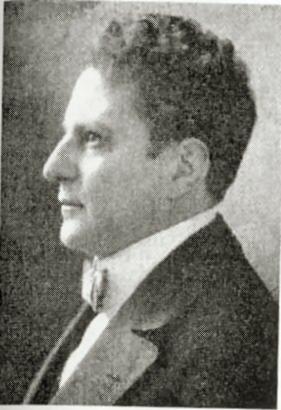Alfred Goltz was born on December 13th, 1877 in Emmendingen. He was born Goldschmidt
and
shortened his name to sing in public.
He started in 1899 in Nürnberg as a baritone.
He sang as such for five years in Regensburg, Koblenz, Rostock and Basel. In Basel,
his colleague Fritz Heuckeshoven pointed out that he was a tenor. During his next season in
Mulhouse, he studied the role of Lohengrin. He had great success
when
he sang the part as a guest in Leipzig, where he immediately got a contract (1905). He further studied
singing there and chose Urlus, first tenor in Leipzig, as his guiding star. In
1908, he replaced Bolz in Stuttgart, but stayed only until 1910: he went to Coburg, where
he was (other than in Stuttgart) the only heldentenor.
With a baritonal voice and imposing stage presence, he was predestined to be
a Wagnerian tenor.
But he had difficulties learning parts. He needed more time than he was allowed by the rapidly
changing
repertory; a tenor was supposed to learn at least twelve parts a year. However,
with the parts he knew, he had good success.
After two years in Coburg, he moved to the newly founded Deutsche Oper Berlin,
where director Georg Hartmann was impressed by him.
As the house had no repertory yet, plenty of rehearsal time was available, plus there were
three other heldentenors besides Goltz, so his limited repertory was not a problem. On January 11th, 1913, he took part in the
house premiere of Wieland der Schmied (composer: Kurt Hösel), and in 1914 sang Parsifal.
On December 7th, 1916 he sang Siegfried in Weimar and was thought to be the successor
of Heinrich Zeller, who was
retiring. But he was drafted; during a leave from the front,
he returned to Weimar for Tristan (June 1918). This time, he got a contract for the 1919/20 season. When he came to Weimar in
Otober 1919, he was met with aloofness; the theater was obviously trying to contract out of the agreement, and antisemitic
resentment (Goltz was Jewish) seems to have played an important part in it. He was offered another audition, which he justly
declined. After singing Tannhäuser in December, the management declared his success with the audience insufficient, and since
there was a clause that his contract would be valid only if he was successful, director Ernst Hardt fired him.
From then on he lived in Berlin as a freelance artist. His name
disappeared from theater chronicles in the mid-1920s.
He lived into Nazi times since there is an official document from 1938
prohibiting his acceptance into the Reichsmusikkammer (the professional body of the German musicians, off-limits for all Jews), but
whether or not he survived the shoah is not known.
